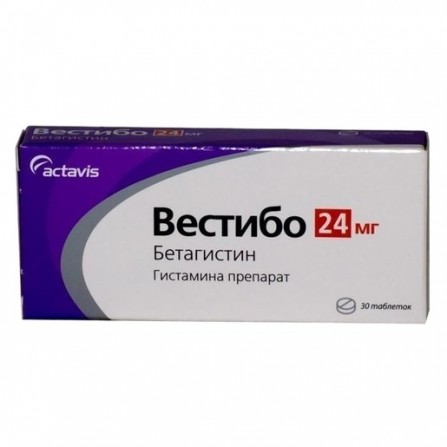More info
Active ingredients
Betahistine
Release form
Pills
Composition
Tablets 1 tab. betahistine dihydrochloride 24 mg, excipients: povidone K90, MCC, lactose monohydrate, colloidal silicon dioxide, crospovidone, stearic acid, purified water (not contained in the finished preparation)
Pharmacological effect
Synthetic analogue of histamine. It is a weak histamine H1 receptor agonist and a rather potent histamine H3 receptor antagonist. It has a histamine-like and vasodilating effect. It affects the cochlear blood flow and the central vestibular apparatus. The action of the drug includes vasodilation in the inner ear (indirectly through histamine H3 and H1 receptors), an inhibitory effect on the vestibular nuclei (through histamine H3 receptors) and the impulse activity of the ampullary receptors. By direct agonistic effect on the histamine H1-receptors receptacles inner ear and precapillary sphincters microvasculature disposed in the vascular strip (stria vascularis), as well as indirectly via the histamine H3-receptors, improves microcirculation and permeability of the inner ear capillaries normalizes endolymph pressure in the labyrinth and cochlea, increases blood flow in the basilar artery. It has a pronounced central effect, being an antagonist of histamine H3-receptors of the nuclei of the vestibular nerve. Normalizes conductivity in polysynaptic neurons of the vestibular nuclei at the level of the brain stem. Indirectly acting on histamine H3 receptors, it increases serotonin content in the brain stem, which reduces the activity of vestibular nuclei. It helps to eliminate violations from both the vestibular and cochlear apparatus: it reduces the frequency and intensity of dizziness, reduces tinnitus, and improves hearing in cases of its reduction. Betahistine stimulates histamine H1 receptors, therefore, does not have a sedative effect and does not cause drowsiness.
Pharmacokinetics
Absorption and distribution: Following oral administration of betahistine, the dihydrochloride is rapidly absorbed from the gastrointestinal tract. Cmax in plasma is reached after 3 h. Plasma protein binding is low. Withdrawal: T1 / 2 is 3-4 hours.Almost completely excreted in the urine as a metabolite (2-pyridylacetic acid) within 24 hours.
Indications
Dropsy of the labyrinth of the inner ear. Vestibular and labyrinth disorders: dizziness, noise and pain in the ears, headache, nausea, vomiting, hearing loss. Vestibular neuritis, labyrinthitis, benign positional dizziness (including after neurosurgical operations), Menera's disease. In complex therapy: Vertebrobasilar insufficiency. Posttraumatic encephalopathy. Atherosclerosis of cerebral vessels.
Contraindications
Hypersensitivity. Pheochromocytoma. Bronchial asthma. Peptic ulcer and duodenal ulcer in the acute phase. Pregnancy (i trimester). With caution: Peptic ulcer of the stomach or duodenum (in history). Pregnancy (ii – iii trimester). Childhood.
Precautionary measures
On the part of the digestive system: dyspepsia (nausea, vomiting).
Use during pregnancy and lactation
The drug is contraindicated for use in the first trimester of pregnancy. Precautions should be prescribed the drug in the II and III trimesters of pregnancy.
Dosage and administration
Inside, during a meal, without chewing, squeezed with a small amount of liquid. Tablets with a dosage of 24 mg: on 1 / 2–1 tab. 2 times a day. The maximum daily dose is 48 mg.
Side effects
Dyspepsia (nausea, vomiting), skin rash, angioedema.
Overdose
Symptoms: headache, flushing of the skin of the face, dizziness, tachycardia, decreased blood pressure, bronchospasm.
Interaction with other drugs
Antihistamines, while taking reduce the effect of the drug Vestibo.
special instructions
The therapeutic effect of the drug in some cases appears only after several months from the start of treatment.






